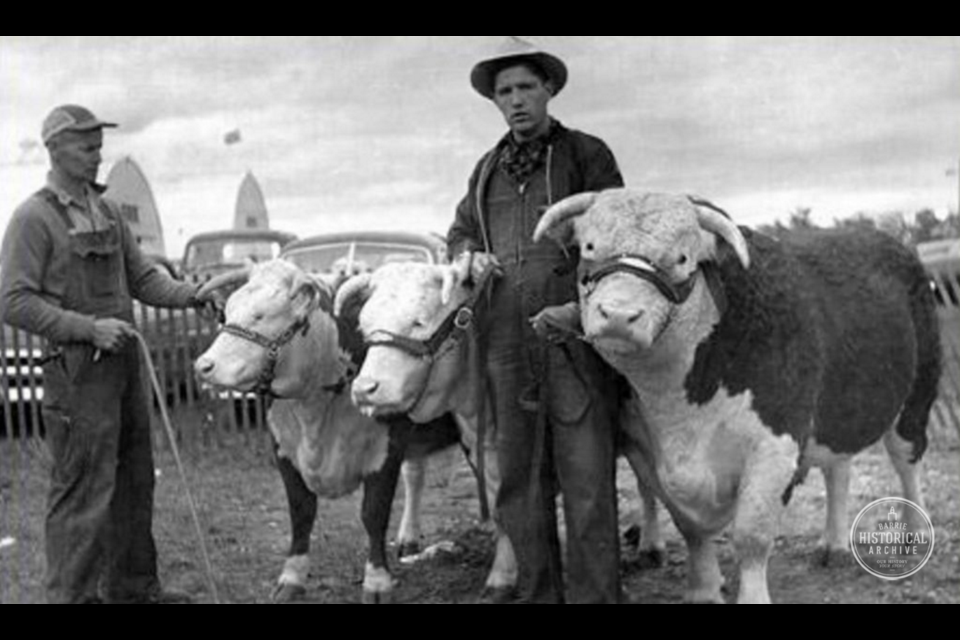Barrie was a market town, always was, and still is today.
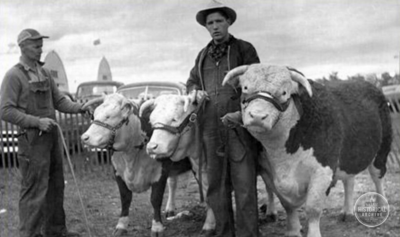 Cattle at the Barrie Fair, September 1958. Photo courtesy of the Barrie Historical Archive.
Cattle at the Barrie Fair, September 1958. Photo courtesy of the Barrie Historical Archive. In the old days, lumbermen and farmers brought in their goods – cattle, hay, horses, timber, eggs, vegetables and such, then departed with a pocketful of cash, some of which was likely to be left at a local tavern.
Today, the market has reversed. Now the folks from outlying areas bring their money to Barrie, and many still do drop quite a few dollars at various watering holes, and spend a good sum more at the hundreds of shops and restaurants around this city.
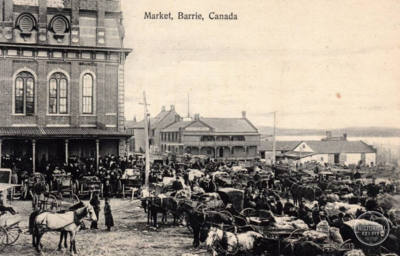 Market Square after 1877 renovations. Photo courtesy of the Barrie Historical Archive.
Market Square after 1877 renovations. Photo courtesy of the Barrie Historical Archive. Barrie still hustles and bustles. Gone are the dirt streets and plank sidewalks, nightly brawls in front of the Simcoe Hotel, shouting auctioneers, lumber-laden steamboats and houses of ill fame. Now, we have busy malls and shopping centres, gridlocked streets, hour waits at popular eateries, festival crowds and sold-out shows.
It makes you want to run off to the countryside, doesn’t it? Fresh air, peace and tranquility, a simple life that anyone would want.
All of those things did, and do, exist in the rural areas of Simcoe County. What also could be found was hard work, unending labour that kept families alive, always at the mercy of the weather or wild animals, miles from schools, doctors and shops.
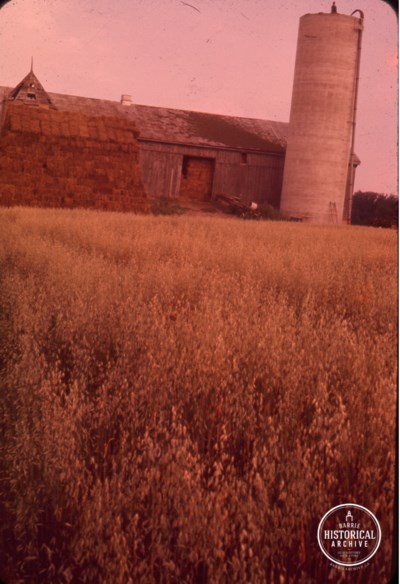 Barn and silo at the Warnica Farm, September 1961. Photo courtesy of the Barrie Historical Archive.
Barn and silo at the Warnica Farm, September 1961. Photo courtesy of the Barrie Historical Archive. A lot of the time, farmers walked a fine line between surviving and losing it all. They had plenty of adversities to deal with on a good day, and the last thing they needed was to be robbed by cattle rustlers.
Cattle rustlers in Simcoe County? Yes indeed. Not just fictional characters in a John Wayne movie, these low-down n’er do wells popped up more often than you would think in this part of Ontario, and the worst thing about a cattle rustler was that he was not some stranger from ‘the city’ but most likely one of your trusted neighbours.
It was not such an easy crime to commit. Before trucks existed, cattle had to be driven on the hoof from their proper farm to a place where they could be hidden before they were sold. It was hard not to notice several head of cattle being herded along a country road.
Before 1865, the theft of cattle was among the long list of offences subject to the death penalty.
On November 29, 1923, the ‘Barrie Examiner’ quoted Judge Vance as he admonished Albert Peacock, whom he had just sentenced to 2 years in Burwash Penitentiary.
“In the West a few years ago, it was the cause of nearly all the trouble the Mounted Police had to deal with. Lynching for cattle rustling was the home-grown cure in many instances. But since that time, cattle stealing has become almost a lost art.”
The reporter added “So that when such a case should come to light in Simcoe County, the interest from farmers for miles around was kindled and they trooped in to hear the facts regarding it.”
Unusual as that case was at the time, one stranger still unfolded 4 years later. On the front page of the July 28, 1927 edition of the ‘Barrie Examiner’, two stories shared the spotlight – the death of the relatively young Judge Vance who had tried the Peacock case, and the story of a house robber being killed by a homeowner near Beeton. The latter story would lead to a gang of cattle drovers turned rustlers.
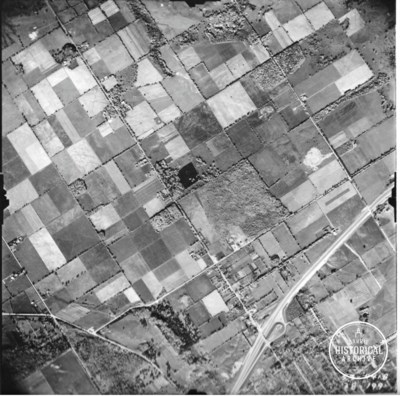 Bayfield St. north of Highway 400, nothing but farms, circa 1952. Photo courtesy of the Barrie Historical Archive.
Bayfield St. north of Highway 400, nothing but farms, circa 1952. Photo courtesy of the Barrie Historical Archive. Alex Hodge, a single farmer, received $610 for some cattle one night and was confronted by a burglar immediately afterwards in his home. A fight ensued and the burglar ended up dead. He was later identified as Dan Forsythe, a friend of the men who had paid for the cattle, and a set-up was right away deduced.
One of the drovers who had paid Hodge was Joseph McDermott, and he soon laid out to police an intricate web of cattle thieving, that had continued for perhaps 2 years, and gave names that ended up in the arrests of 9 local men.
Two of the accused were brothers, Elwood and Samuel Nevils, who had taken the particular animals that they stole from the farm of their own uncle, Job Nevils, where they were employed.
In a sad side story, an explosion at the farm that Samuel Nevils had recently rented, was for a while thought to be connected to the whole unpleasant rustling business. Within days of his arrest, 3 of Samuel Nevils’ children were badly injured when they set off dynamite blasting caps while playing in a shed. A six-year-old boy and a 4-year-old girl later died of their injuries.
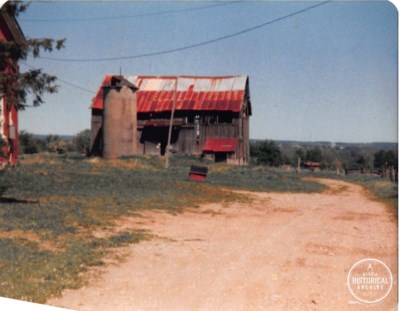 The Bell Farm on St. Vincent St. just north of Cundles Rd., circa 1960. Photo courtesy of the Barrie Historical Archive.
The Bell Farm on St. Vincent St. just north of Cundles Rd., circa 1960. Photo courtesy of the Barrie Historical Archive. At their October trial, all of the men but one pleaded guilty. Only Frank Skelly of Adjala Township insisted he was innocent. Joseph McDermott, believed to be the ringleader, got the most time – 6 years in the penitentiary at Kingston.
Frank Skelly was found guilty and sentenced to 2 years in prison. No one knows the whole story but, not long after getting out, Skelly was found dead in his burning house. He had been doing odd jobs locally but could not keep up the payments on his farm, and it had been recently sold at the time of his death.
Returning to the community in which you had committed such underhanded transgressions against your own neighbours could not have been easy. Even the notice of his death in the ‘Northern Advance’ contained a reminder.
“Frank Skelly, one of the Beeton cattle rustling gang, met a tragic death on Saturday evening last.”
Each week, the Barrie Historical Archive provides BarrieToday readers with a glimpse of the city’s past. This unique column features photos and stories from years gone by and is sure to appeal to the historian in each of us.
